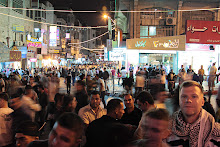So, based on my reading, here are the questions I have:
- One theme that resonates throughout chapters 5, 6, and 9 is that of the complexity and fungibility of identity in Ottoman/Mandate Palestine. If, as you argue, there weren't discrete, ossified, coterminous identities among the residents of the region (prior to 1948), does that imply, then, that a one-state solution was possible and even preferable back then? And, at the same time, does the movement away from the complex identities and communitarian notions of these "confessional communities" therefore imply a concomitant move away from a one-state solution and necessitate talk of a two-state solution?
- There is a great deal of literature in social psychology and political psychology that parallels Edward Said's Orientalism, particularly in the construct of the Other--particularly to the end of constructing an idea of the self. Do you see that this notion of the Other feeds nationalism and separateness in Israel/Palestine, or do you think that the reverse is true--that the nationalist drive of the Israeli proto-state fosters a notion of Other-ness. In other words, which comes first--the chicken (nationalism) or the egg (Other-ness) in your reading of Israel/Palestine?
- Ethnography is a research method applicable to many questions, but geopolitics has largely shied away from ethnography, often because of the difference in scales between research subjects and where power is assumed to reside (individuals vs. states). Your writings have explicit geopolitical connections drawn between ethnography and state power: do you feel that this is a "natural" way of analyzing geopolitics? In other terms, you are critical of revisionist renderings of quotidian life in Israel/Palestine by the powers that created the contemporary dispute--is a return to the story of the individual (i.e., hearing the subaltern speak) a solution to this inscribing of history by the powerful?
- (bonus question) What work is done by historians like Armstrong, who tend to write the narratives against which your ethnographic studies argue? That is, Armstrong portrays religion in Israel/Palestine as contested and contesting, whereas you paint a picture of syncretic and communitarian practice (if not belief). Is there a place for Armstrong's reading, or is this type of history just a starting point, so that we can begin to uncover the complexities that are left out of traditional narratives?


No comments:
Post a Comment